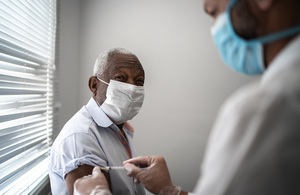4 in 5 adults receive first dose of coronavirus (COVID-19) vaccine
Over 42 million first doses of COVID-19 vaccines have been administered across the UK.

- 58% of adults in the UK have had both doses, giving them the fullest possible protection
- Public urged to come forward for second doses to help protect against the threat of new variants
More than 4 in 5 adults in the UK have received their first dose of a COVID-19 vaccine, as the vaccination programme continues at unprecedented pace and scale.
With 72,891,861 doses administered in total, 42,216,654 people across the UK have now been vaccinated with a first dose (80%), while 30,675,207 people have had both doses (58%).
New analysis by Public Health England (PHE) shows for the first time that 2 doses of COVID-19 vaccines are highly effective against hospitalisation from the Delta (B.1.61.2) variant. The analysis suggests the Pfizer/BioNTech vaccine is 96% effective and the Oxford/AstraZeneca vaccine is 92% effective against hospitalisation after both doses.
The government met its target of offering a vaccine to the most vulnerable by 15 April and is on track to offer a first dose to all adults by 19 July, 2 weeks earlier than planned.
By 19 July, all those aged 40 and over and the clinically extremely vulnerable, who received their first dose by mid-May, will have been offered their second dose.
Health and Social Care Secretary Matt Hancock said:
Now that 4 in 5 adults in the UK have received their first dose of a COVID-19 vaccine and more than half of adults have had a second jab, we are entering the final furlong in our race against the virus.
Vaccines save lives and have enabled us to restore many freedoms that we cherish. To allow us to ease restrictions fully, it is more important than ever that people come forward for their jabs when eligible and book a second dose to receive the fullest possible protection.
We’re accelerating our vaccine programme by reducing the time between doses for all people aged 40 and over to 8 weeks and the NHS will open invites for everyone aged 18 and above later this week. So if you get the call, get the jab to fight this virus.
Our successful vaccination programme is weakening the link between cases and hospitalisations. The latest evidence shows that 2 doses are needed to provide effective protection against the Delta variant.
To ensure people have the strongest possible protection against COVID-19, second doses for all over 40s will be accelerated by reducing the dosing interval from 12 weeks to 8 weeks.
The move follows advice from the independent experts at the Joint Committee on Vaccination and Immunisation (JCVI), which has considered the latest available evidence and has recommended reducing the dosing interval to counter the threat of new variants of concern.
The government and its scientific experts are monitoring the evolving situation and rates of variants closely, and will not hesitate to take additional action as necessary.
Vaccines Minister Nadhim Zahawi said:
The UK has reached yet another important milestone on the road to recovery by vaccinating 4 in 5 of the UK adult population with a first dose.
The NHS continues to work tirelessly to save lives through the largest vaccination programme in its proud history. It is vital people continue to come forward when eligible as we redouble our efforts to offer second doses and provide the fullest possible protection.
Vaccinated people are far less likely to get COVID-19 with symptoms. Vaccinated people are even more unlikely to get serious COVID-19, to be admitted to hospital, or to die from it and there is growing evidence that they are less likely to pass the virus to others.
Data from PHE’s real-world study shows the vaccines are already having a significant impact in the UK, reducing hospitalisations and deaths, saving 14,000 lives and preventing 42,000 hospitalisations in England.
Data published by YouGov shows the UK continues to top the list of nations where people are willing to have a COVID-19 vaccine or have already been vaccinated.
ONS data published on 9 June, shows that more than 9 in 10 (94%) adults reported positive sentiment towards the vaccine.
Approved vaccines are available from thousands of NHS vaccine centres, GP practices and pharmacies. Around 98% of people live within 10 miles of a vaccination centre in England and vaccinations are taking place at sites including mosques, community centres and football stadiums.
Background information
Health Secretary Matt Hancock delivered a speech in Oxford on 2 June praising the ‘vaccine heroes’ and reflecting on the lessons learned from the vaccination programme.
The latest UK-wide vaccination statistics have been published.
NHS England have published vaccine statistics.
PHE have published the latest analysis on the efficacy of COVID-19 vaccines and the latest study on household transmission.
The Office for National Statistics produced a survey on ‘Barriers to COVID-19 vaccination’.
YouGov displayed data comparing uptake rates in countries around the world.
To date, the government has invested over £300 million into manufacturing a successful vaccine to enable a rapid roll-out.
The UK government is committed to supporting equitable access to vaccines worldwide. The UK is one of the largest donors to the COVAX facility, the global mechanism to help developing countries access a coronavirus vaccine, and has committed £548 million in UK aid to help distribute 1.3 billion doses of coronavirus vaccines to 92 developing countries this year.
Backed by the UK government, the Oxford/AstraZeneca vaccine is available to developing countries at cost, and in June we announced the UK will donate at least 100 million surplus coronavirus vaccine doses within the next year, including 5 million beginning in the coming weeks.
Visit the NHS website for advice on how to book or manage a COVID-19 vaccination appointment.